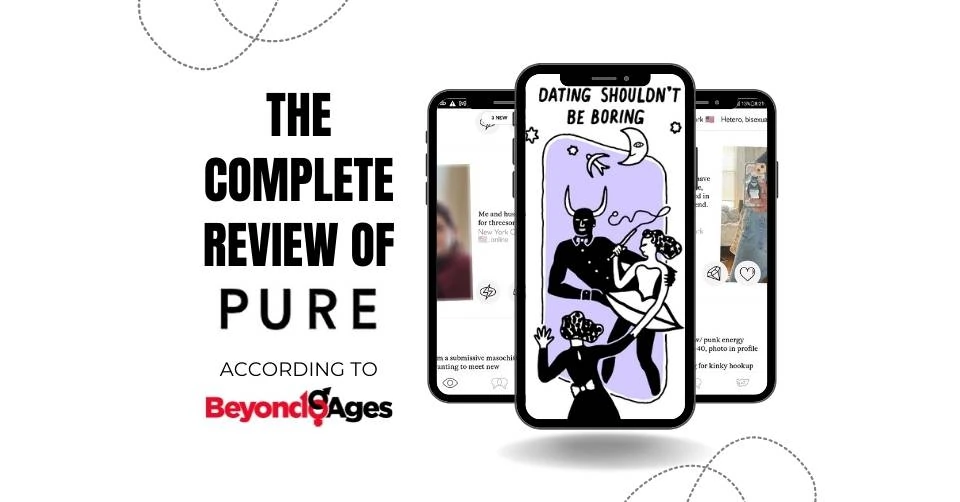When you purchase through links on our site, we may earn an affiliate commission. Here’s how it works.
2024 Pure Review: Purely for Hookups or a Waste of Time?

Hook-up apps are fast becoming all the rage. The longer the world spends in the online dating era, the more interesting and unique hookup apps appear. “Today, if you own a smartphone, you’re carrying a 24/7 singles bar in your pocket,” author and comedian Aziz Anzari said in his dating advice book ‘Modern Romance’. But that doesn’t mean that all hook-ups are worth your time and money. “The world is available to us, but that might be the problem,” Ansari adds. Let’s talk more about this in our Pure review.
But first, just in case you’re looking for fantastic alternatives when it comes to finding dates or hookups, take a look at the top options we always recommend. These 3 dating apps have large userbases that make it easy to find your ideal hot date:
| Site | Our Experience | Our Rating | Free Trial Link |
|---|---|---|---|
Best Hookup Site For MILFs  | Experience Highlights
| 9 | Try AFF For Free |
Best For Relationships  | Experience Highlights
| 9 | Try eHarmony |
2nd Best For Hookups  | Experience Highlights
| 8 | Try Passion |
Pure markets itself as a shameless hookup app. It has a unique design and lots of unique features to separate itself from the other hook-up apps out there. But how easy is it find a casual sex partner using Pure? And how much bang will you get for your buck? As an online dating enthusiast who has reviewed dozens of hook-up apps over the years, I made it my mission to answer the questions. And I’ve done exactly that in this comprehensive Pure review.
You will have to pay for a subscription to send messages to women using Pure. That’s what made me even keener to review this app for you, as I’m sure you wouldn’t want to waste your money on a hookup site that delivers nothing but disappointment.
Beyond Ages reviews are regarded among the most detailed and trusted on the internet because they’re based on extensive testing of the app in question. And I was happy to use my expertise to put Pure through its paces. So, read on to discover how effective the Pure hookup app is likely to be for you.
In order to be able to accurately compare one dating service to another, it’s crucial to create a reliable methodology for our tests, so that’s what we did.
In most cases, we would create a profile with the same photos and bio for our tests. Then, we would send messages to 50 suitable women in our target area and these would come from our vault of tried-and-tested online dating openers. However, with Pure, I was in the unique position of testing a dating app that didn’t have profiles at all. Only ads. So I made one.
I made it my goal to answer 50 ads within the target area, make note of how many people replied and try to swap contact details with as many of them as possible.
I would be making notes about various aspects of the app’s design, usability and various features. But my overall verdict would mostly be based on how easy it was to land a hook-up with a great woman on the app.
We know that men are mostly interested in:
- How many active users are on the app
- How easy it is to meet them in real life
Our methodology allows you to answer these questions and compare one dating app to another. After following it for my Pure review, I can give you the truth about what to expect when using it.
Pure Review: Is This “Shameless” Dating App Fire Or Trash?

We’ll begin our review with a basic summary for those who don’t care to read about all the ins and outs of the Pure hookup app. Below, you’ll find ratings out of 10 for the most important aspects of the app that affect how likely you are to have a satisfying experience. We also compare it with the top hookup app out there right now:
 |
 |
|
|---|---|---|
| Overall Our team rates each site objectively based on many hours of independent research, the features each site offers, and how it compares with other sites. The ratings are the opinion of our editors and their extensive experience. |
3 | 9.5 |
| Quality of Women Our opinion of how attractive the typical woman is that uses this site and how easy they are to connect with compared to other sites. |
3 | 9 |
| Popular How many people are using this site to actually meet people compared to other sites. |
3 | 9 |
| Usability How easy is this site to use and how quickly can an average person begin meeting people compared to other sites. |
5 | 10 |
| Privacy & Safety Does this site take proper precautions to safeguard its members, their identity, and their data. |
10 | 10 |
| Effective Our opinion of how easily an average person will be able to achieve their dating goals with this site compared to other sites. |
2 | 9 |
| Value Will the time and money spent using this site pay off for an average person based on the opinions and experience of our editors. |
2 | 10 |
As you can see from the score above, our time on Pure wasn’t “purely” delightful. There were certainly some things we liked about it but compared to AFF, which has really been delivering for a lot of guys, it just isn’t a contentest. Let’s get into some more specifics about what we experienced:
 The Pure app has a fantastically modern design, but it’s set up like an old-school ad board. You’ll write an advert, attach pictures (if you want) and wait for responses. These responses might come in the form of Likes, Messages or Digital Gifts.
The Pure app has a fantastically modern design, but it’s set up like an old-school ad board. You’ll write an advert, attach pictures (if you want) and wait for responses. These responses might come in the form of Likes, Messages or Digital Gifts.
You can respond to other people’s adverts, but only after you’ve paid to publish yours.
Here are the most important parts of my experience using Pure that you need to know about before posting an advert there yourself.
There are plenty of filthy adverts to respond to
Pure calls itself the shameless dating app and a large percentage of its user base has fully embraced that vibe. Many women’s ads featured graphic descriptions of what they were looking for in the bedroom.
Sadly, there was a decent percentage of adverts without any pictures attached, meaning users would have no idea who wants to have this filthy thing done to them unless that person sent pictures later on. This was a huge let-down for me, and is likely to put many people from using Pure at all. According to a Pew Research study, 71% of dating app users say catfishing is “very common”, while 50% say the same about fake scam accounts. I’d imagine many people would be on their guard against this when evaluating Pure ads without pictures.
Detecting scammers online is especially important since according to the Federal Trade Commission, “The median reported loss of romance scams is about seven times higher than for other frauds,” says Emma Fletcher, senior data researcher at the Federal Trade Commission. That’s roughly $2,600. Not to say that Pure will lead to you getting scammed. But as someone with years of experience with dating apps, I say it’s always best to keep an eye out for suspicious users who seem too eager.
 Your likes and messages disappear after 24 hours
Your likes and messages disappear after 24 hours
There are three ways to respond to Pure ads. Likes, Messages and Gifts.
You’ll need to both have “liked” each other’s ad before the app lets you message each other, unless you buy an Instant Chat. These are roughly $5 each or $20 for five, although the price varies depending on what country you’re based in. It will cost you money to get their attention with virtual “gifts” too.
The thing is: because Pure places a lot of emphasis on making things happen FAST and also on anonymity, the app removes all traces of the likes sent after 24 hours. This feature might help to prevent women being harassed or overwhelmed with messages; a problem that the majority of female dating app users deal with, according to Pew Research. Still, it would mean respectful non-harassers like me would need to rely on their love interests being online within a day of “liking” their ad.
The thing is: because Pure places a lot of emphasis on making things happen FAST and also on anonymity, the app removes all traces of the likes sent after 24 hours. That means I’d need to rely on being online within a day of me “liking” their ad.
Interestingly, the app itself didn’t reveal this to me. It was only after scouring the FAQs on the Pure website that I found out about this 24-hour rule. This feature arguably makes it a lot more difficult to make a connection with someone on Pure, even if it does encourage quick meet-ups.
 Our ad didn’t get much attention at all
Our ad didn’t get much attention at all
I checked Pure every day and got one Like. That person chose to leave the chat a few minutes after I sent my opener. This was despite the 50 Likes I sent to women in New York.
Now, there’s every chance that our ad wasn’t enticing enough for the sex-hungry women of Pure. I used the same somewhat vanilla bio that we use for all our tests, after all. It’s also possible that the generic photo of the guy I used as my selfie wasn’t enticing to anyone looking to hook up.
Of dating app photos, Ash Wright, resident writer and dating expert, says, “They’re the first thing women will use to decide if they want to talk to you or not. This makes them critical to getting matches and raising your Elo score. It also makes it your first opportunity to demonstrate who you are.”
But more likely I received such a disappointing reception due to the lack of active users on the app.
There were barely 50 ads to respond to in New York – one of the world’s most happening cities for online dating – plus all the Likes I sent would have disappeared within 24 hours.
So, as cool and unique as the idea of Pure might be, it didn’t even tease me with a hint of action during this extended testing period. Very disappointing.
How did other Pure users feel about their experience?
After completing my review, I sourced the web for other people’s opinions about Pure. The majority of men seemed to agree that it was a frustrating experience. Most disgruntled reviewers were unhappy at being made to pay up before even getting the chance to browse or test the app.
Dominic Learwood, Google Play Store:
“Expensive! You have to pay just to chat to a person, and you can’t even check the app out or try the features without subscribing. You can’t adjust the features either. It makes you scroll a large list of ads. The nearest date could be 100km away!”
Just A User, Google Play store:
“There was not anyone around neither in my city, nor in the nearest few hundreds of miles. And when I asked for a refund, they told me that they can’t do it. Waste of time and money.”
Purple Planet, Google Play store:
“Allow basic features such as match within 20-mile radius and chatting, and only then will you guys have a chance to beat the other apps. Hiding behind a paywall for basic features is literally handicapping yourselves.
Why AFF is a better option
It’s cool that Pure is trying to take a different approach to hookup apps and it’s possible that some users do get some action from this app – but different isn’t always better. Pure undeniably pales in comparison to the classic hook-up website AFF.
AFF is the daddy of hookup websites, and it’s still the most effective for quickly and easily finding a casual sex partner. It’s set up almost like a social media website, allowing you to browse photos and send messages to any users who pick your fancy. You don’t have to worry about your message being deleted after a specific amount of time either.
The AFF community is HUGE – comparing it to Pure would be like comparing Goliath to David – so you’re unlikely to suffer from a lack of attention on this website.
We’ve used AFF in several locations around the world and were always able to quickly connect with beautiful, sex-hungry women.
You can see for yourself just how awesome the AFF hookup site is now, because it’s currently running a free trial.
Positives and Negatives
Pure is overall an okay app. The anonymity features are great, but it doesn’t seem to be that popular. Below is a summary of the app’s best and worst features.
- A fun unique design
- Hot babes looking for filthy bedroom fun
- There are plenty of features to protect your anonymity
- You have to buy a subscription to post an ad or respond to other people’s ads
- The in-app purchases that allow you to stand out are expensive
- Your likes and messages will disappear after 24 hours
- I barely got a hint of interest while testing the app
 Profiles, Pictures And Members
Profiles, Pictures And Members
“Photos are the first thing someone looks at when viewing a dating profile,” says Courtney Quinlan, founder of Midwest Matchmaking.
The problem is: there are no profiles on Pure, only ads. Members are encouraged to be unfiltered about what they’re looking for when writing their ads. Many oblige by posting their bedroom fantasies in great detail. You can attach pictures to your ad, but this is not compulsory and there was a disappointingly high number of ads without pictures.
There are no profiles on Pure, only ads. Members are encouraged to be unfiltered about what they’re looking for when writing their ads. Many oblige by posting their bedroom fantasies in great detail. You can attach pictures to your ad, but this is not compulsory and there was a disappointingly high number of ads without pictures.
Pure allows you to send pictures to members you’re chatting with, and there are features that ensure your anonymity here. You can upload risque pictures to your secret “vault” then choose when a specific member can access it, for example. This can spare you from having to keep your nudes saved on your phone.
There was a wide range of ages and attractiveness levels among the women who shared pictures on their Pure ads. The majority of members were unashamedly kinky, but it would have been nice to connect with more of them.
“Finding the right person is a numbers game,” Quinlan said, adding that the more people you can put yourself in front of, the higher your chances of finding someone great.
But that means actually putting your face out there. So, if you’re using Pure and you’re serious about making a connection, I’d urge you to find the courage to add a photo to your ad.
“A killer dating photo doesn’t just show people what you look like, it tells them what you’re made of,” explains Saskia Nelson, founder of dating photography brand Hey Saturday.
“If you’re smart, you can use your photos to tell people more about who you are rather than writing it in the bio.”
“The choice to remain anonymous online, especially in dating profiles, is a complex interplay of personal experiences, societal pressures, and the innate human need for connection,” said Jane Doe, a psychologist who specializes in digital behaviors.
Anonymity can be empowering for many, allowing them to shed societal labels and be their authentic selves. But, it also can be a double-edged sword, leading to feelings of isolation or deception.”
The Pure Alternatives For Hookups Most Recommended For Regular Guys
If you’re a normal guy looking for a little more casual fun listen up. You’re probably using the wrong apps. If you want to get some real results with women there are a few options you need to try first:
| Site | Our Experience | Our Rating | Free Trial Link |
|---|---|---|---|
Best For Relationships  | Experience Highlights
| 9 | Try eHarmony |
Best For Casual Fun  | Experience Highlights
| 9 | Try AFF For Free |
Great If You're Handsome  | Tinder Highlights
| 8 | Try Tinder |
Design
While the majority of dating apps appear very corporate in design, Pure adds a splash of modern art to its aesthetic and is very easy to navigate. On top of that, unlike other dating apps that place a huge emphasis on photos, Pure places equal emphasis on photos and bios. This made each profile a lot more interesting as it juxtaposes fairly tame (though sometimes provocative) photos with a bio that’s unashamedly NSFW.
Messaging and chatting
You can’t send a message on Pure unless you “match” with a member first, meaning you like their ad and they like yours. That is unless you buy an Instant Chat, in which case you can send a message before this mutual interest is established.
Your chat will disappear after 24 hours unless both members agree to extend it. It’s possible to send photos that vanish after they have been viewed – and both members will be alerted if someone tries to capture a screenshot. You can also delete your chat messages at any time, and they’ll disappear from the other person’s screen too.
Advertisements
There were no adverts on Pure, apart from links to useful advice on how to use the app.
Pricing
You can pay $14.99 to post your ad for a week, $29.99 to post it for a month or $69.99 to post it for a year. You can only respond to other people’s ads when you have one posted yourself.
I also tried Pure in the UK, which have similar price points in pounds sterling.

Make sure to stay safe on Pure
As I mentioned, there are a lot of adverts on Pure with no photos attached, so it’s recommended to be especially vigilant about your safety when engaging with these. There is a higher risk that you’re dealing with catfishes or scammers when responding to anonymous ads on Pure.
So, take these three steps to keep yourself when using this hookup app.
- Don’t be too vulnerable too quickly. Yes, a lot of men particularly love the idea of meeting a horny woman online and meeting within a few messages, but this premise is the perfect way to fall into the trap of unscrupulous dating app users. “There’s a lot of physical and emotional vulnerability in dating,” explains psychotherapist Kelly Scott, LMHC. “There’s a lot of physical and emotional vulnerability in dating,” she says. “When we are making decisions that make us vulnerable, we need to also be thinking about safety.”
- Move the conversation to social media. If you’ve built a nice rapport on Pure, it’s a smart move to switch the conversation to a social media app like Facebook or Instagram. This will allow you to learn more about this person, and vice versa. More importantly, you’ll get a good sense of whether they were representing themselves accurately in their Pure ad.
- Arrange a video call. Video calls will give you an even better sense of who this person is and whether you feel comfortable around them. A quick 5 or 10-minute call is recommended before you meet any stranger from a dating app, even if it’s only to test whether you have chemistry in your conversations.
- Meet in public. If you do make the leap to meet someone from Pure, it’s a safe step to meet in public first. I’m not saying you shouldn’t go back to their place to fulfil your wildest fantasies, just that it’s a nice idea to get to know them in a bar or cafe first. If something feels off about their behavior, it’s perfectly fine to end the date there even if you had agreed to hook up. Make sure to let a friend know where you’re going to be as well.
- Trust your gut feeling. You might be tempted to ignore your inhibitions when there’s a chance of fast and easy sex, but that attitude could lead to your downfall. “Trust your instincts,” said cybersecurity engineer and ethical hacker Precious Olives when questioned on this topic. “Also, trust gradually,” he added. This advice would apply whether you’re messaging on an app or meeting someone in the real world. “When it comes to online dating, your instincts are your best friend,” says experienced NYC matchmaker Vince Ricco. “If something feels off or too good to be true, trust your gut and proceed with caution.”
- Practice safe sex. Let’s imagine that everything goes smoothly and you hit it off with someone you met on Pure. They’re kind, beautiful and they really like you too. It’s still imperative that you practice safe sex with strangers you met off the internet. Even if she claims to be using a contraceptive pill, condoms are still a must for men. Dr Elizabeth Carlin, President of the British Association for Sexual Health and HIV (BASHH) explained: “Condoms remain essential in the fight against STIs, as well as HIV, and we recommend using them for sex with any new or casual partners.” There’s no shame in carrying condoms in your wallet or in your pocket on any first date, particularly if it’s from a hook-up app like Pure. “We urge anyone who is concerned about their sexual health, or risks they have taken, to have a check-up and be tested – it is quick and easy to do, “ Carlin added.
Pure App Frequently Asked Questions
Still not sure whether Pure is for you? Perhaps the answers to these frequently asked questions will tip the scale one way or the other.
What is Pure?
Pure is marketed as a “shameless hookup app”. It’s available on iOS, Android and desktop.
How can I contact Pure?
Send an email to [email protected]
Who actually owns Pure?
Pure is owned by Misterico Limited. Pure appears to be their only app.
Is Pure real?
There is no evidence to suggest there’s anything fake about Pure. All the ads look like they’re written by real people. Sadly, my lack of responses meant that I can’t verify how many real people would appear to be using it on a daily basis.
Is Pure legit?
Pure is a legit hook-up app, although the jury is still out as far as how easy it is to arrange a hookup on this app.
Is Pure a scam or fake?
It’s possible that scammers could use Pure to lure in victims, as they might be able to do on any other dating app. Pure issues alerts when someone writes you a suspicious message though, and the app itself is certainly not a scam.
Is Pure safe?
Pure would appear to be safe to use, as far as the protection of your device, your photos and your financial data. However, as with any dating app, it’s worth taking precautions before meeting up with a complete stranger.
What are Pure alternatives?
You can see our most highly-recommended alternatives to the Pure hookup app in our list of the best hook-up apps and sites we’ve tested.
How does Pure work?
Once you pay for a subscription, you create an ad that can be viewed by others searching in your local area. They can respond with a “like”, a message or a “gift”. To start chatting, you’ll both need to like each other’s ad first, unless one of you buys an “Instant Chat”. From there, you can send messages and pictures, swap contact details and arrange to meet up.
Is there a Pure app?
Yes, Pure is available on iOS and Android, as well as on desktop.
How much does Pure cost?
You’ll have to pay for a subscription to communicate with Pure members. It’ll cost you $14.99 to post your ad for a week, $29.99 to post it for a month or $69.99 to post it for a year.
How can you use Pure for free?
You can actually browse other people’s ads for free on the desktop version of Pure, although you won’t be able to respond to them without paying first. On the mobile app, you can’t do anything of note without first paying for a subscription to post your ad.
Can you send messages for free on Pure?
You can only send messages for free after you’ve bought a subscription and you’ve both liked each other’s ad.
How do you cancel your Pure account?
You’ll have or cancel your Pure account within the iOS or Android store, rather than within the app itself.
References:
Anderson, M. (2020). The virtues and downsides of online dating. Pew Research Center: Internet & Technology.
Ansari, A., & Klinenberg, E. (2015). Modern romance. Penguin Books.
Courtney, Q. (2023). When they do not have a face pic: Dating profile red flags. eNotAlone.
Department of Health & Social Care. (2017). Campaign to protect young people from STIs by using condoms. GOV.UK.
Federal Trade Commission. (2019). Romance scams rank number one in total reported losses.
Kelly, S. (2023). 12 essential dating safety tips. Tawkify.
Olives, P. (2023). Growing online dating scam leaves victims… [LinkedIn post]. LinkedIn.
Scott, K. (2023). How to stay safe on dating apps: What you need to know. Mindbodygreen.
Smith, A. (2020). Young women often face sexual harassment online – including on dating sites and apps. Pew Research Center.
White, S. (2023). How to craft the perfect dating profile: 7 simple tips. Insider.
Contributing Authors:
Joe Elvin
Joe Elvin is an internationally known confidence and dating coach with nearly a decade of experience. He is the successful author of several dating and confidence books that have helped thousands of men find success. While traveling the world Joe consistently finds new and valuable ways to meet and attract women. He has been featured in many large publications including AskMen, TSB Magazine and The Good Men Project.
As one of the most prolific writers on Beyond Ages, Joe has reviewed over a hundred dating apps. He is the site’s foremost authority when it comes to selecting what dating app works for whom. From an app’s mechanics to its algorithm to telltale signs that a dating app is a scam, Joe’s is able to expertly discern between dating apps that provide value and those that don’t.





